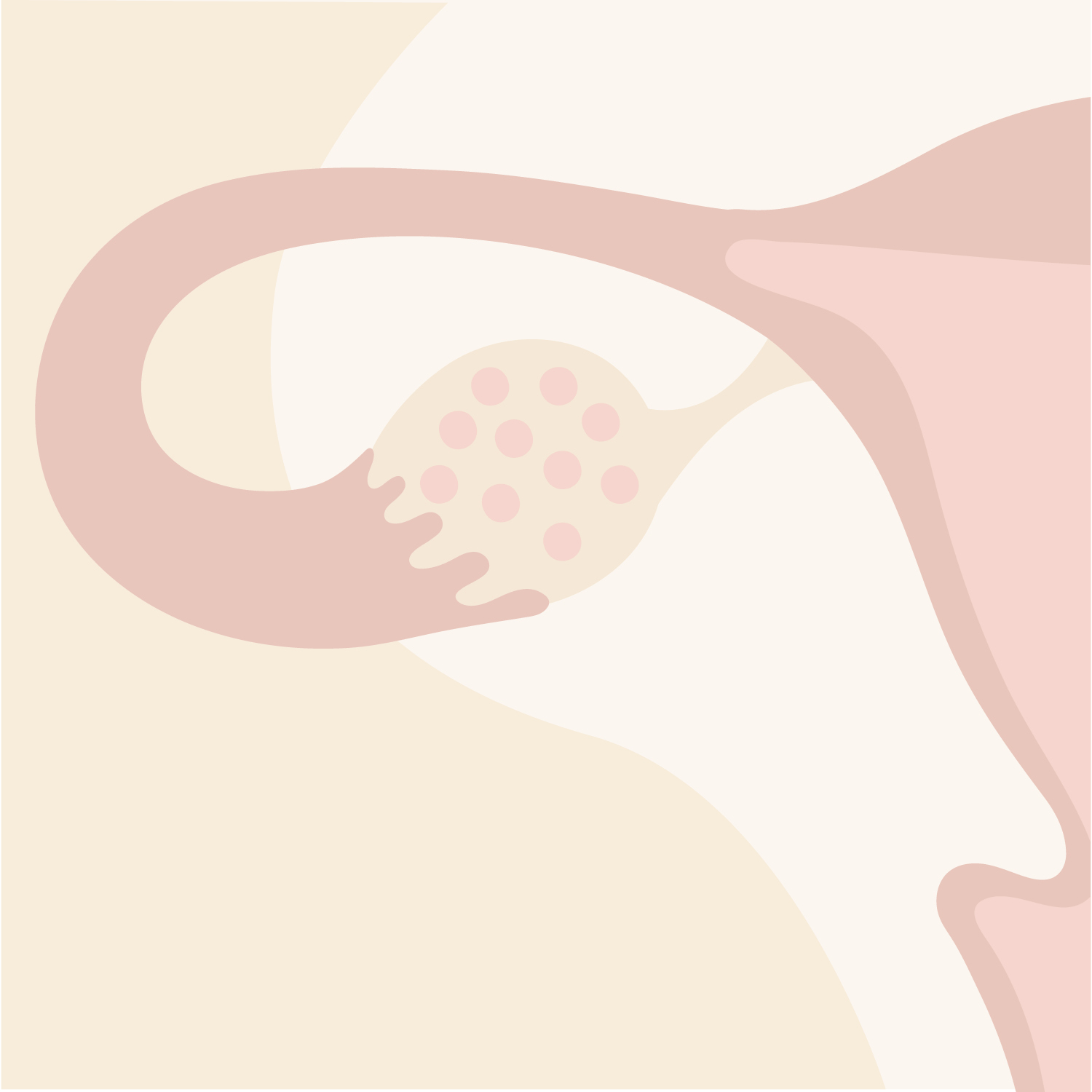Aug 21, 2022
UNDERSTANDING PCOS
Chances are you’ve heard PCOS mentioned among your friendship circle, or maybe you’ve even been diagnosed yourself – in which case you would be joining the 8-13% of other Australian women who are affected by PCOS.
For a condition that’s so prevalent, though, PCOS isn’t talked about nearly enough. To get the conversation started, we are joined by naturopath and women’s health expert Georgia Hartmann to help us understand PCOS. From its causes and diagnosis to the difference between PCOS and PCO, Georgia covers everything we need to know about the condition.
On polycystic ovary syndrome
Polycystic ovary syndrome, or PCOS, is the most prevalent hormonal condition among women of reproductive age. Despite what is commonly believed, PCOS is not just a reproductive disorder — it’s now also considered a metabolic disorder. This is because insulin resistance is one of the primary physiological imbalances in many, if not all, cases of PCOS. Insulin-resistant PCOS is the result of heightened insulin levels, meaning the body becomes resistant to insulin and this, consequently, drives androgen production (androgens being male sex hormones, such as testosterone). Often, if there’s insulin resistance, there will also be obesity because insulin influences how our bodies store glucose and fat. It’s important to note, though, that a person may have insulin resistance and not be overweight or obese.
While those affected by PCOS will frequently present with insulin resistance, there are three additional physiological drivers of PCOS that are worth knowing: post-pill PCOS, adrenal PCOS and inflammatory PCOS. Post-pill PCOS is often considered transient PCOS, as it occurs when the pill induces an excess production of androgens (as well as causing other hormonal imbalances) and will generally subside as hormones rebalance. Adrenal PCOS, which is tested using the DHEAS test, results from an excess of adrenal androgen. When this hormone is out of balance, it indicates high levels of stress and this stress can then induce PCOS.
The third driver, inflammation, is the outcome of endocrine-disrupting chemicals. These are a group of chemicals, and there are hundreds of these chemicals in the body, that affect the endocrine system, or our hormone system. Endocrine-disrupting chemicals are found in many products ¬— think skincare, makeup, shampoos and even sanitary products that aren’t TOM Organic! The primary endocrine-disrupting chemicals are phthalates, parabens and phenols bisphenol (your plastics). Even a plastic container or a plastic water bottle that says it's BPA-free is just as problematic as a BPA-containing plastic. This is because BPA simply stands for bisphenol A and, instead of using bisphenol A, the plastics company will just use bisphenol F or S or Z. Research indicates that these other bisphenols are just as hormonally active as BPA.
It's important to remember that PCOS could be caused by a combination of these drivers, and being able to identify the main cause of your PCOS will help you determine the best treatment.
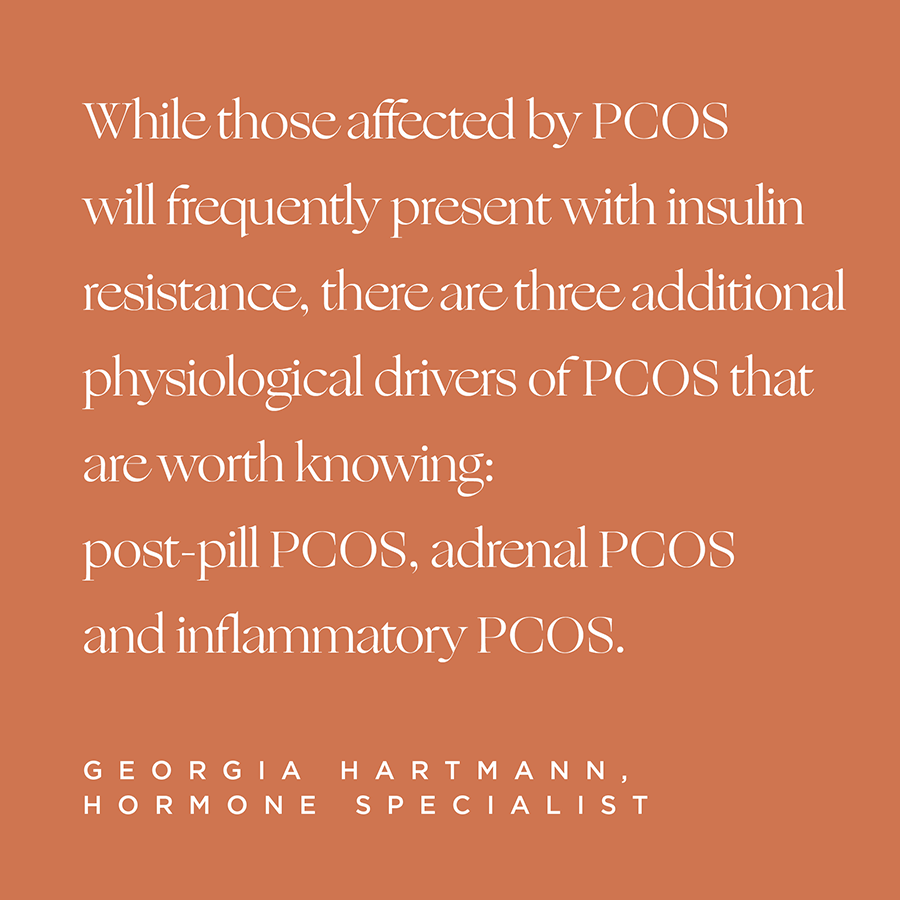
On diagnosing PCOS
When it comes to diagnosing PCOS, there are two different criteria used. The one most relevant to insulin-resistant PCOS will test androgens in the blood. If androgens are elevated, it’s a clear sign of PCOS. When your androgens are elevated, you might notice acne, particularly around the chin and jawline, as well as facial hair growth. You may even notice hair around the nipples, or on your chest and back. This is all the result of heightened levels of male sex hormones.
Elevated androgens also adversely impact ovulatory function, meaning that the ovaries may not produce an egg. This is why PCOS is one of the leading causes of infertility and difficulty conceiving. In saying this, however, many women with PCOS can get pregnant. Certain lifestyle changes, as well as hormone balancing, can help make this possible. Essentially, managing insulin-resistant PCOS is about decreasing androgens in the body.
On signs and symptoms of PCOS
While certain characteristics are more common, there are a wide range of symptoms that can be indicative of PCOS. You may be a thinner woman who is having difficulty conceiving, or you may be someone who is struggling to lose weight. Other people may also notice they have acne or facial hair growth. In some cases, women may not know they have PCOS until they are trying to conceive and realise that they're not ovulating.
This is where testing is important. Checking your hormones to see whether you are ovulating and checking that your androgens are at a healthy level will give you an indication of whether or not you may be affected by PCOS.
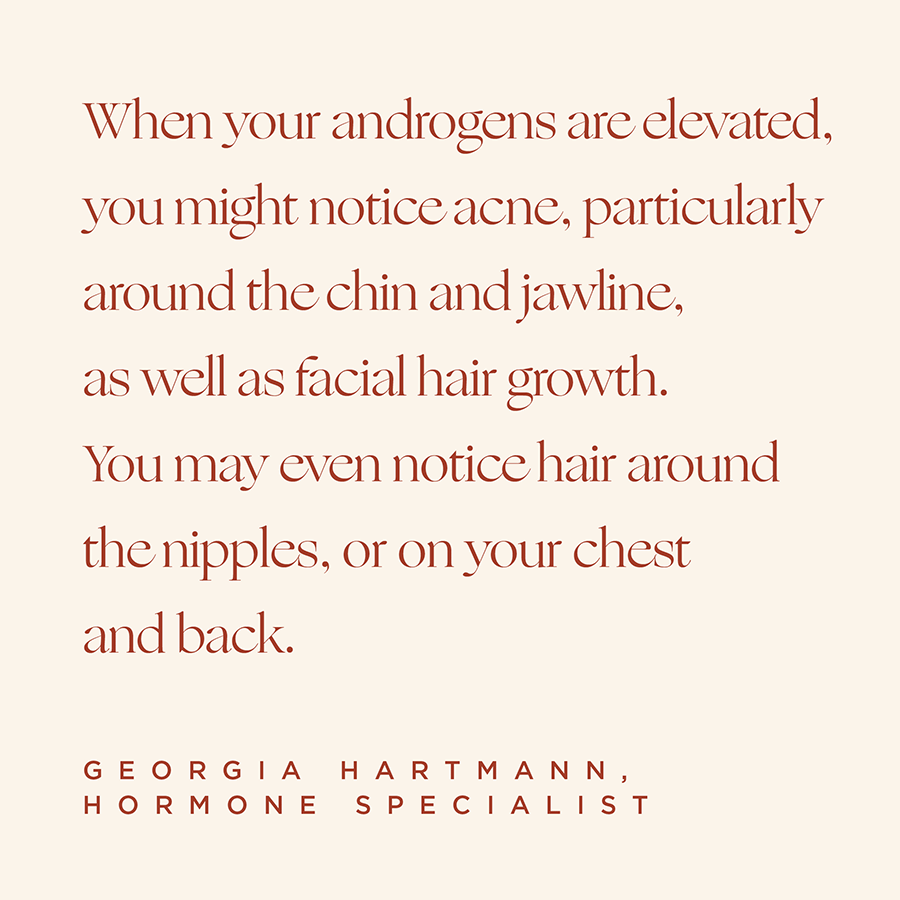
On the difference between PCO and PCOS
Contrary to what is often assumed, there’s a big difference between PCO and PCOS! PCO simply means polycystic ovaries, whereas PCOS is a metabolic condition that results from hormone imbalances.
The primary difference between the two is the androgens, and there’s often confusion in the way that PCOS and PCO are diagnosed. In the past, diagnosing PCOS was usually done using a pelvic, or internal, ultrasound. When a person is not ovulating for any reason, for instance, because they are stressed, underweight, overexercising or taking the pill, these ultrasounds would show what looks like polycystic ovaries. These ovarian cysts would likely be everywhere because, during normal ovulation, an egg is released from the dominant follicle which is ruptured by the ovary. The ovary then reabsorbs the remaining follicles. This process, the egg maturation cycle, then begins again. If a person didn’t ovulate, however, follicles will not release an egg but instead remain in the ovary and then be picked up by the ultrasound. As a result, it may be diagnosed as polycystic ovary syndrome when in fact it’s just polycystic ovaries as a result of ovulation not occurring — rather than polycystic ovary syndrome which is driven by the androgens.
Essentially, whether or not a person has PCOS comes down to their androgen levels and this is why it’s important to test these in the blood for a proper diagnosis.
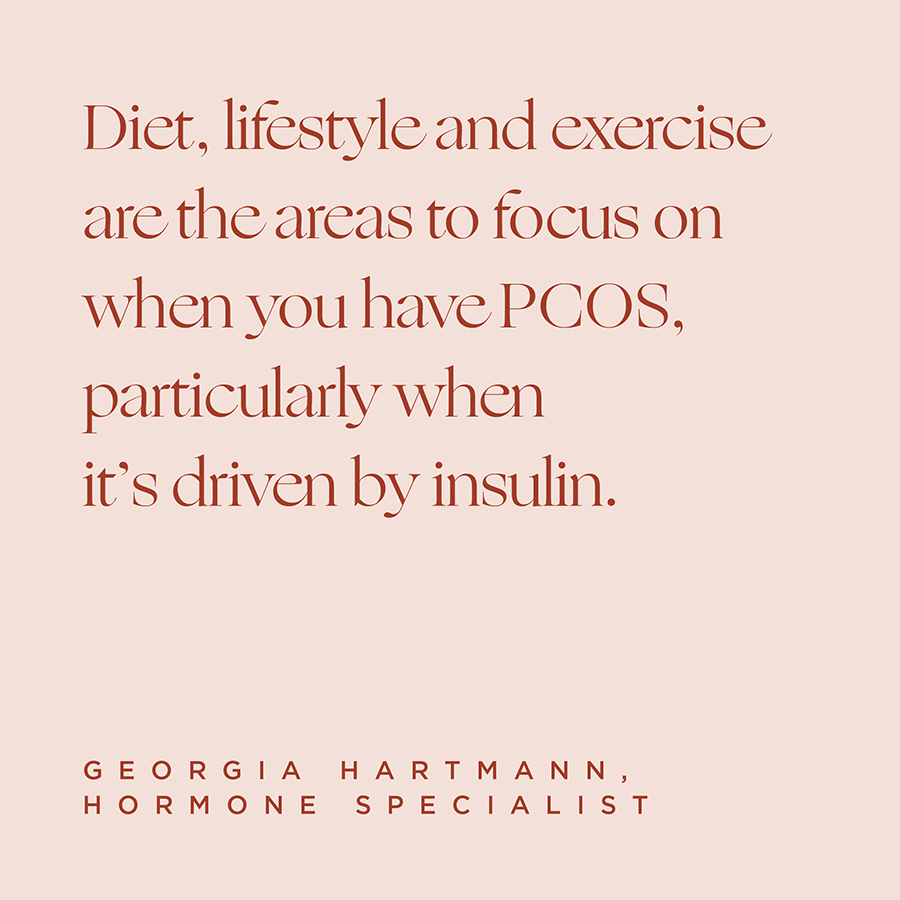
On managing PCOS
As the main driver of PCOS is insulin resistance, the best way you can reverse insulin resistance is to do so naturally! Diet, lifestyle and exercise are the areas to focus on when you have PCOS, particularly when it's driven by insulin. We want to ensure we have good insulin sensitivity. From a food standpoint, the best approach a person can take is to completely cut processed sugars. Fruit and vegetables are fine, but avoiding sweets is a good idea. Eating too much sugar drives resistance to insulin and does little to improve our insulin sensitivity. Completing cutting sugar may be challenging at first, but after a few weeks you’ll see significant improvements to your weight, mood and energy.
When it comes to exercise, resistance-based training is also important. When you move the big muscles in your body, it helps sensitise your cells to insulin and therefore reduces insulin levels in the blood. This could be weights at the gym or, my personal favourite, reformer Pilates. For many of the women I see at Hormone Health Studio, resistance training paired with quitting sugar is often enough to fix insulin resistance.
A PCOS diagnosis is never ideal, but a proper treatment plan can help you get your hormones back in balance. As with many hormonal conditions, the first step towards managing your PCOS symptoms is to first understand the underlying issues.
Blogs

Jun 08, 2022
EXPLORING PERIOD CARE IN CULTURES AROUND THE WORLD
Our TOM Talks panelist Sabina McKenna explores how different cultures around the world approach period care.
Read More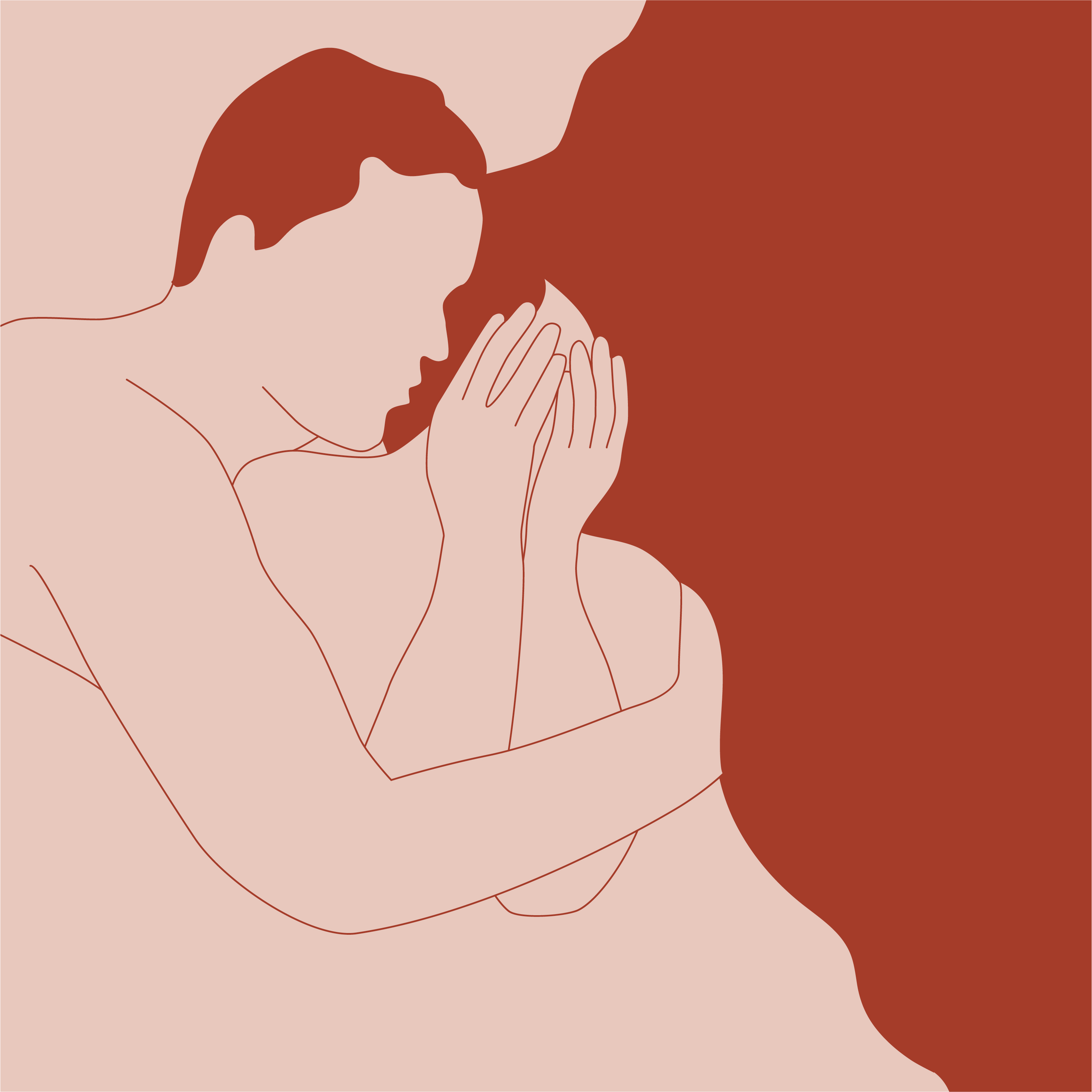
Jun 08, 2022
STOP APOLOGISING FOR HAVING YOUR PERIOD
Our TOM Talks panelist Mel Mason talks about the importance of not apologising for having your period.
Read More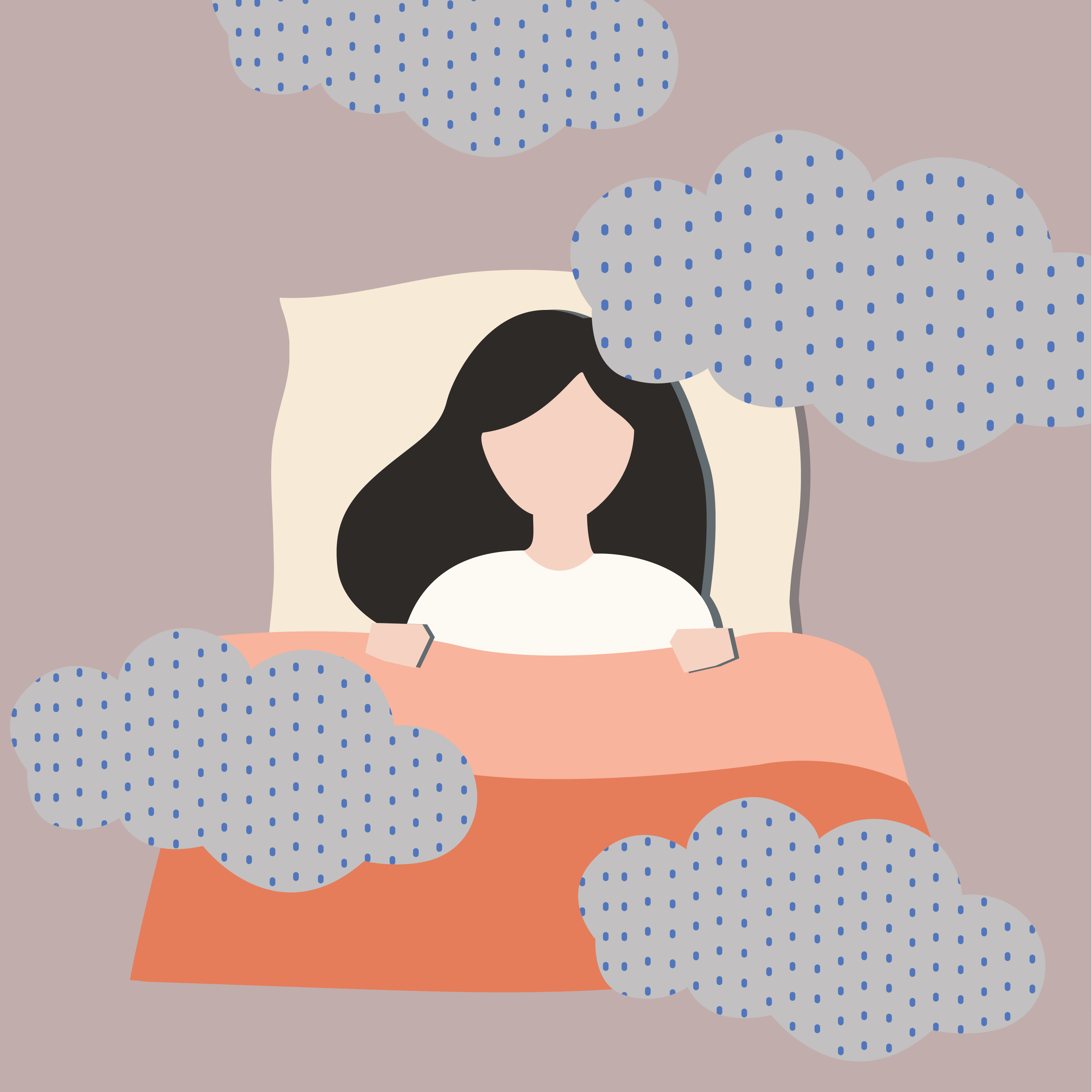
Jun 07, 2022
STRESSED? NOT SLEEPING? TRYING TO CONCEIVE?
TOM Talk's panelist Georgia Hartmann discussed the links between stress, sleep and fertility.
Read More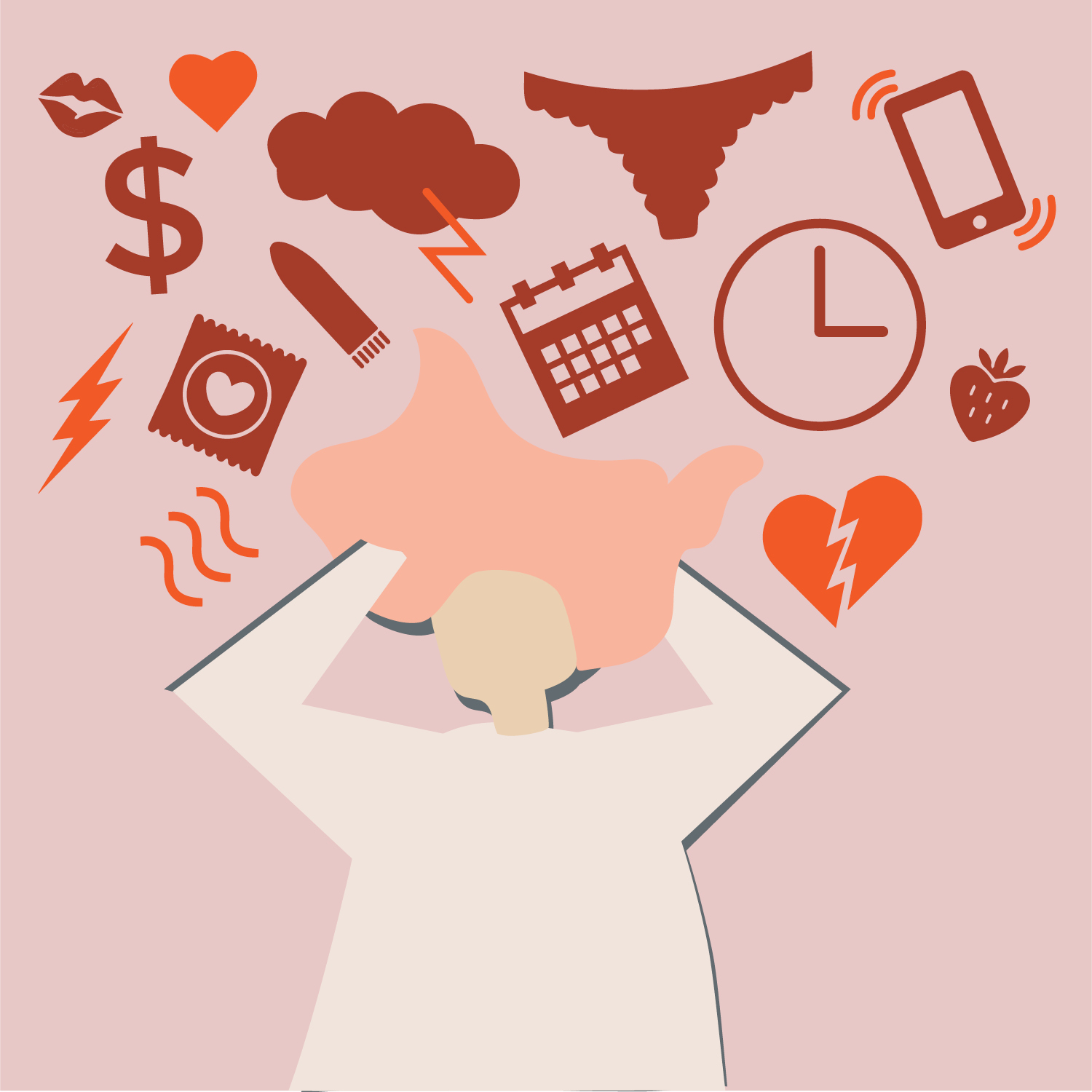
Jun 07, 2022
STRESS AND HOW IT AFFECTS YOUR SEX DRIVE
Certified sex coach Georgia Grace is here to unpack the link between stress and sex.
Read More
